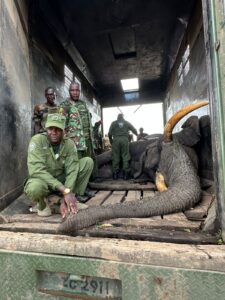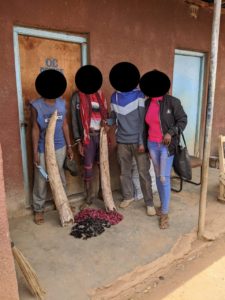 The Mara Elephant Project intelligence unit and Kenya Wildlife Service (KWS) continue to root out ivory being brought into Kenya across neighboring borders and the second half of 2020 was no exception when MEP’s intelligence led to the recovery of 176 kg of ivory. Pictured left: Ivory bust in August where two people were arrested and 35 kg of ivory was recovered. We had a first of its kind incident on Lake Victoria when our intelligence team led us to Busia near Uganda where we were tracking 15 pieces of ivory coming out of Tanzania. The suspects then decided the safest way to cross the border was via boat through Ugandan waters and then back into Kenya. While the suspects and the informant were on the water a Ugandan patrol boat approached them and they threw the six sacks of tusks overboard; lost to the depths of Lake Victoria forever. There were two ivory recoveries in the southern portion of Loita Forest, and outside of the Mara ecosystem, MEP’s intelligence led to arrests and recoveries in Kitui County near Mwingi National Reserve and north of Karatina near the Mt. Kenya Forest boundary, truly showing just how far MEP’s intel team travels to follow up on ivory seizures and arrests.
The Mara Elephant Project intelligence unit and Kenya Wildlife Service (KWS) continue to root out ivory being brought into Kenya across neighboring borders and the second half of 2020 was no exception when MEP’s intelligence led to the recovery of 176 kg of ivory. Pictured left: Ivory bust in August where two people were arrested and 35 kg of ivory was recovered. We had a first of its kind incident on Lake Victoria when our intelligence team led us to Busia near Uganda where we were tracking 15 pieces of ivory coming out of Tanzania. The suspects then decided the safest way to cross the border was via boat through Ugandan waters and then back into Kenya. While the suspects and the informant were on the water a Ugandan patrol boat approached them and they threw the six sacks of tusks overboard; lost to the depths of Lake Victoria forever. There were two ivory recoveries in the southern portion of Loita Forest, and outside of the Mara ecosystem, MEP’s intelligence led to arrests and recoveries in Kitui County near Mwingi National Reserve and north of Karatina near the Mt. Kenya Forest boundary, truly showing just how far MEP’s intel team travels to follow up on ivory seizures and arrests.
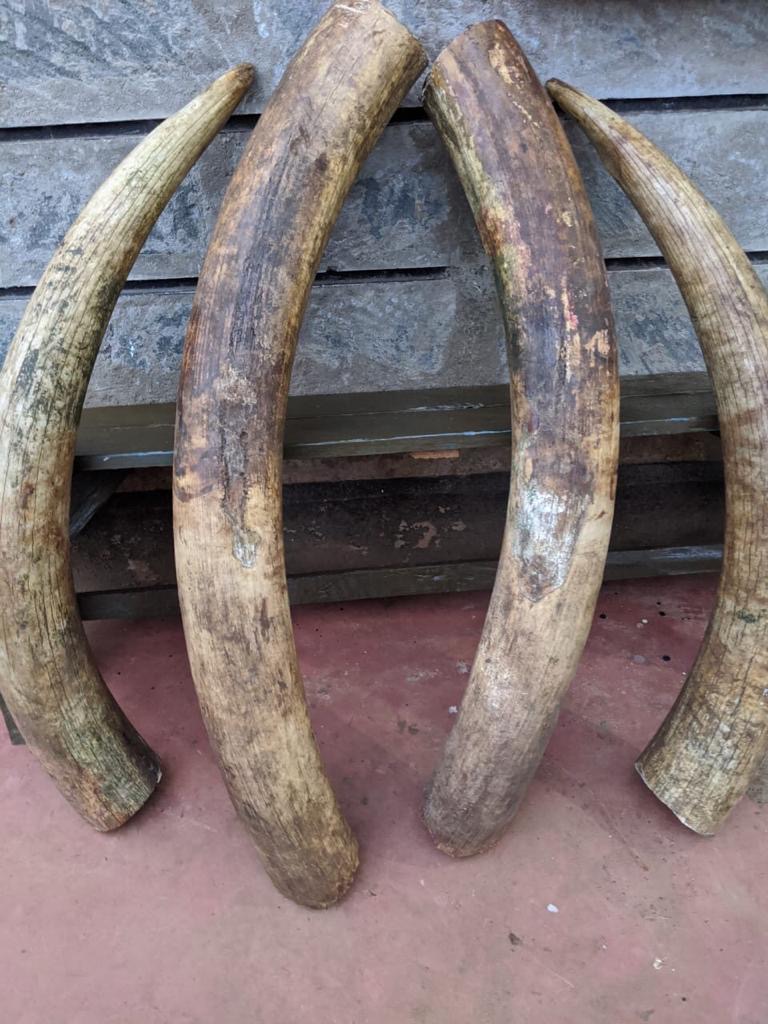
An ivory bust in September of 95 kg of ivory.
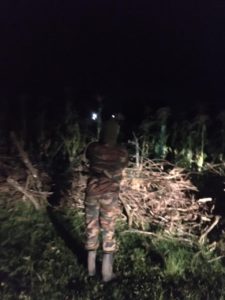 MEP rangers responded to a high level of conflict during the second half of 2020. Pictured left: MEP rangers responding to conflict day and night in July. During one conflict mitigation operation near Aitong our Suzuki vehicle was damaged when one of the elephants drove its tusks through the rear side window while MEP rangers were pushing them out of community land. Luckily, both MEP rangers and the elephant were unharmed. In the southern area of Olderkesi near Cottars 1920s Camp we got reports of rogue bulls coming into settlement areas and also raiding tomato farms along the Sand River. We sent the Charlie rapid response team into this area to respond. It was a very wet December, and our data suggests that in January we will see an increase in conflict. So, we will be gearing up to protect farms as the crops ripen. Overall, in the second half of 2020, MEP rangers responded to a total of 49 conflict incidents.
MEP rangers responded to a high level of conflict during the second half of 2020. Pictured left: MEP rangers responding to conflict day and night in July. During one conflict mitigation operation near Aitong our Suzuki vehicle was damaged when one of the elephants drove its tusks through the rear side window while MEP rangers were pushing them out of community land. Luckily, both MEP rangers and the elephant were unharmed. In the southern area of Olderkesi near Cottars 1920s Camp we got reports of rogue bulls coming into settlement areas and also raiding tomato farms along the Sand River. We sent the Charlie rapid response team into this area to respond. It was a very wet December, and our data suggests that in January we will see an increase in conflict. So, we will be gearing up to protect farms as the crops ripen. Overall, in the second half of 2020, MEP rangers responded to a total of 49 conflict incidents.
It’s amazing that in 2020 MEP was not only able to retain our full complement of rangers through these difficult times, which has led to a record number of arrests and recoveries, but also add an additional 10 rangers to increase protection in the Loita Hills. In the second half of 2020, we have seen the highest levels of bushmeat poaching and habitat destruction since our inception; however, we have also been frustrating logging operations, arresting bushmeat poachers, and continuing the protection of wildlife, communities and habitat.
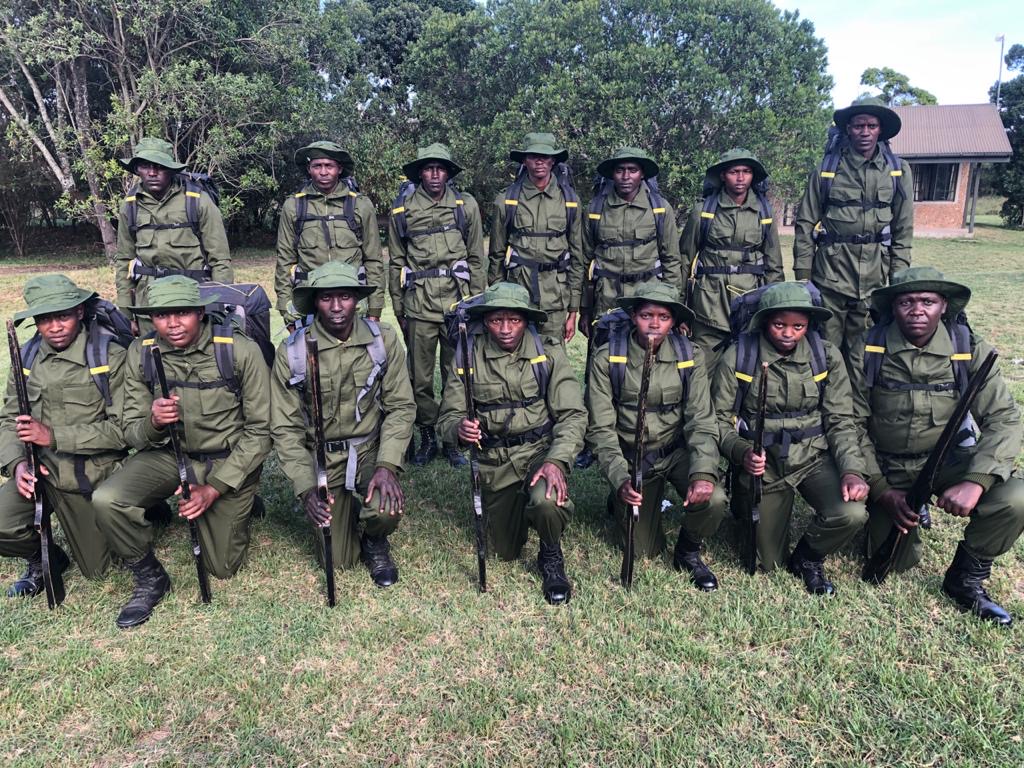
The new MEP rangers all kitted up and ready to be deployed.
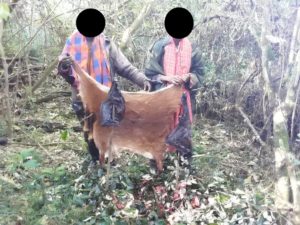 Rangers are hard at work in the forest areas of the Mau, Loita and Nyakweri removing bushmeat snares regularly during their patrols and arresting bushmeat poachers, destroying poacher’s camps and confiscating bushmeat. In total during the second half of 2020, MEP rangers alongside government partners arrested 11 bushmeat poachers, confiscated 100 kg of bushmeat and removed 368 snares. Pictured left: Sheldrick Wildlife Trust (SWT) Mau De-Snaring Unit rangers and government partners confiscated 10 kg of bushmeat and arrested two suspects in the Mau Forest on August 27.
Rangers are hard at work in the forest areas of the Mau, Loita and Nyakweri removing bushmeat snares regularly during their patrols and arresting bushmeat poachers, destroying poacher’s camps and confiscating bushmeat. In total during the second half of 2020, MEP rangers alongside government partners arrested 11 bushmeat poachers, confiscated 100 kg of bushmeat and removed 368 snares. Pictured left: Sheldrick Wildlife Trust (SWT) Mau De-Snaring Unit rangers and government partners confiscated 10 kg of bushmeat and arrested two suspects in the Mau Forest on August 27.
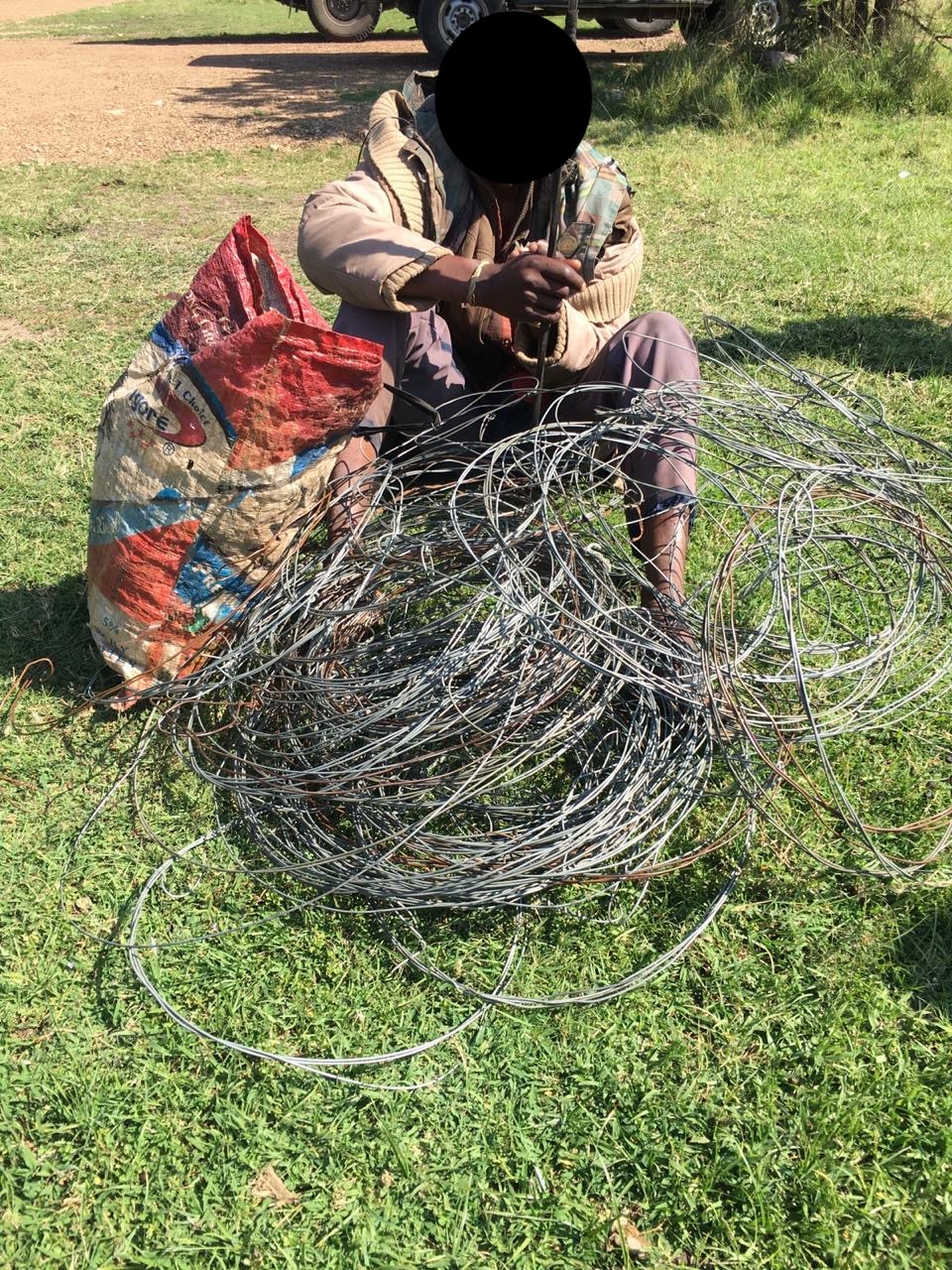
Snares removed by MEP rangers in September with one suspect arrested.
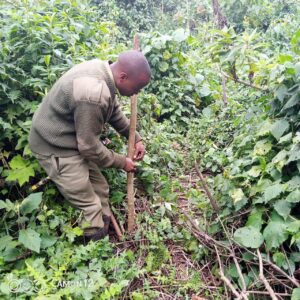 MEP’s SWT Mau Forest De-Snaring Units continue to make an impact in protecting the critically important Mau Forest. In September, the “Charlie Team” SWT Mau De-Snaring Unit was busy and in one week alone removed over 60 snares in their area of operation (pictured left removing snares in November). In October, they also removed 15 snares while out on patrol. In the first four days of November, the MEP/SWT Mau De-Snaring Units stationed in the Mau Forest collected 22 snares within the forest used for bushmeat poaching. The two teams operating in the Mau alongside partners KWS, Kenya Forest Service (KFS) and Bongo Surveillance Project (BSP) also ended November with several notable bushmeat poaching busts. On November 26, three suspects were arrested for bushmeat poaching and the team removed 12 active snares they had set nearby. The next day, the Charlie team alongside KWS and KFS arrested one suspect with 3 kg of bushmeat and confiscated three gazelle skins. Then, on Saturday, November 28, an additional suspect was arrested with bushmeat and finally, on November 30, the Charlie team arrested two suspects alongside KWS, KFS and BSP with 15 kg of bushmeat and gazelle parts. Removing these snares not only saves the smaller animals usually caught in them, but also prevents larger animals like elephants and lions from sustaining life-threatening injuries. This is especially important for the critically endangered Mountain Bongo antelope.
MEP’s SWT Mau Forest De-Snaring Units continue to make an impact in protecting the critically important Mau Forest. In September, the “Charlie Team” SWT Mau De-Snaring Unit was busy and in one week alone removed over 60 snares in their area of operation (pictured left removing snares in November). In October, they also removed 15 snares while out on patrol. In the first four days of November, the MEP/SWT Mau De-Snaring Units stationed in the Mau Forest collected 22 snares within the forest used for bushmeat poaching. The two teams operating in the Mau alongside partners KWS, Kenya Forest Service (KFS) and Bongo Surveillance Project (BSP) also ended November with several notable bushmeat poaching busts. On November 26, three suspects were arrested for bushmeat poaching and the team removed 12 active snares they had set nearby. The next day, the Charlie team alongside KWS and KFS arrested one suspect with 3 kg of bushmeat and confiscated three gazelle skins. Then, on Saturday, November 28, an additional suspect was arrested with bushmeat and finally, on November 30, the Charlie team arrested two suspects alongside KWS, KFS and BSP with 15 kg of bushmeat and gazelle parts. Removing these snares not only saves the smaller animals usually caught in them, but also prevents larger animals like elephants and lions from sustaining life-threatening injuries. This is especially important for the critically endangered Mountain Bongo antelope.
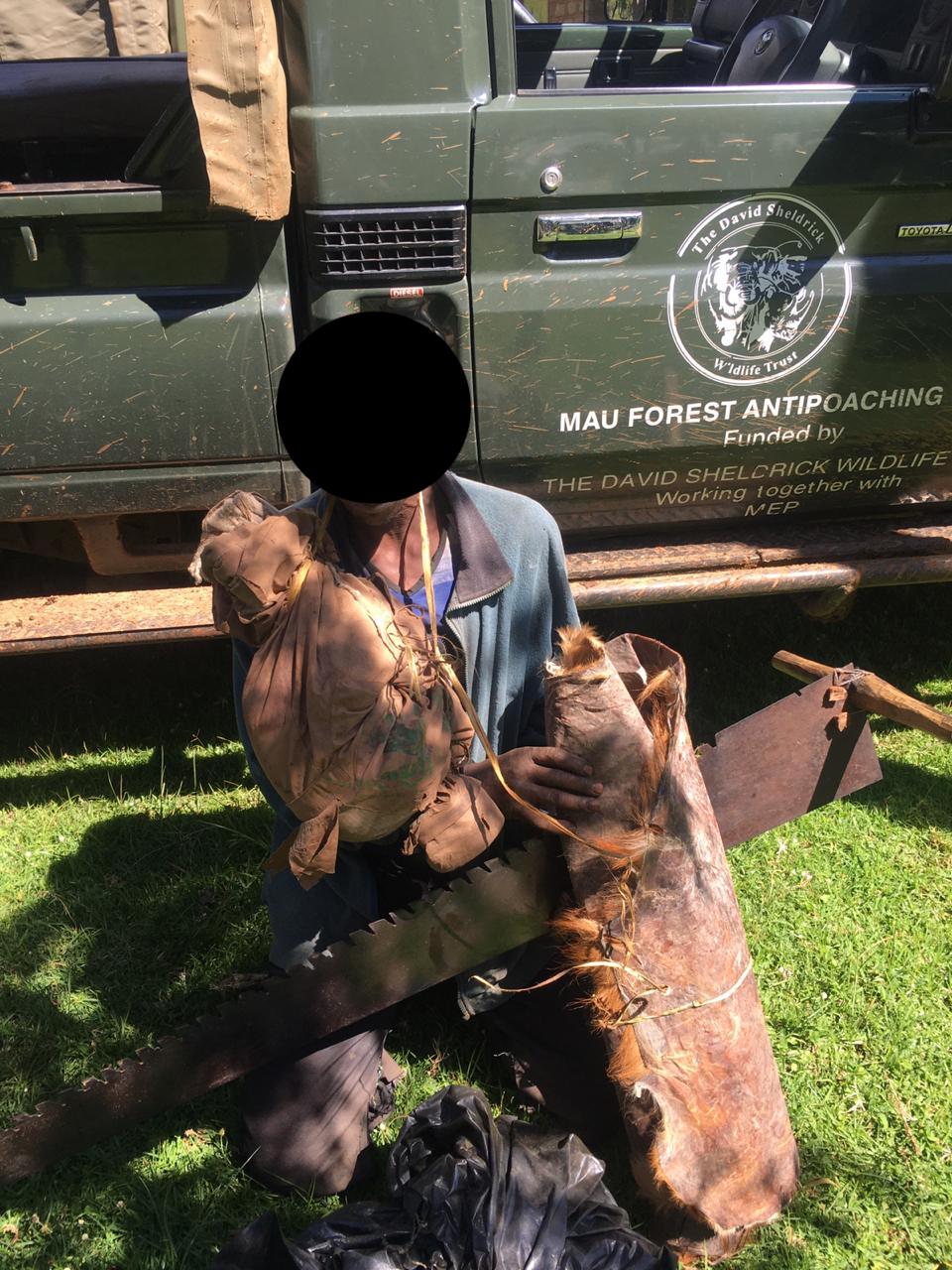
A bushmeat arrest in November made by the SWT Mau De-Snaring Unit and KWS.
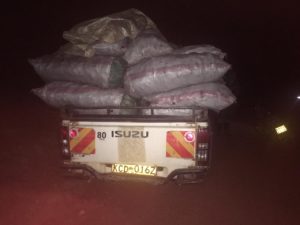 Meanwhile, in the Nyakweri Forest, the protection of the forest and monitoring of collared elephant Fitz continues by MEP rangers alongside KFS and KWS. MEP’s Alpha ranger team stationed there arrested one suspect with over 60 snares and ½ kilogram of bushmeat in a joint operation with KWS, Mara North Conservancy and Olosukut Conservancy rangers. This area is seeing regular conflict and habitat destruction activities and the monitoring on the ground of Fitz not only ensures his and his herds protection, but also deters illegal activity from taking place in the forest. On October 12, while on the ground monitoring Fitz, the team heard the sound of a power saw and went to investigate and they discovered one suspect in the act of cutting timbers using a power saw, arrested him and confiscated the timbers and the power saw. The MEP “Echo” ranger unit ambushed a truck on October 13 at night that was transporting 43 bags of charcoal created illegally inside a protected forest area in the Mara (pictured left). Then, on October 23, MEP rangers arrested one person and confiscated 400 posts in the Naroosura area of Loita.
Meanwhile, in the Nyakweri Forest, the protection of the forest and monitoring of collared elephant Fitz continues by MEP rangers alongside KFS and KWS. MEP’s Alpha ranger team stationed there arrested one suspect with over 60 snares and ½ kilogram of bushmeat in a joint operation with KWS, Mara North Conservancy and Olosukut Conservancy rangers. This area is seeing regular conflict and habitat destruction activities and the monitoring on the ground of Fitz not only ensures his and his herds protection, but also deters illegal activity from taking place in the forest. On October 12, while on the ground monitoring Fitz, the team heard the sound of a power saw and went to investigate and they discovered one suspect in the act of cutting timbers using a power saw, arrested him and confiscated the timbers and the power saw. The MEP “Echo” ranger unit ambushed a truck on October 13 at night that was transporting 43 bags of charcoal created illegally inside a protected forest area in the Mara (pictured left). Then, on October 23, MEP rangers arrested one person and confiscated 400 posts in the Naroosura area of Loita.

Illegal logs confiscated in November.
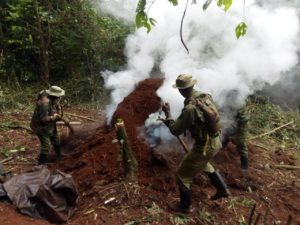 Alongside partners, MEP’s ranger presence on the ground helps increase protection of an area and deter illegal habitat destruction activities. The intelligence gathered and efforts to arrest suspects, confiscate timbers and destroy kilns all contributes to raising the opportunity cost for people partaking in these illegal activities in hopes that we’ll see this critical important habitat maintained. Pictured left: On August 28, SWT Mau De-Snaring Unit rangers destroyed four kilns in the Mau Forest.
Alongside partners, MEP’s ranger presence on the ground helps increase protection of an area and deter illegal habitat destruction activities. The intelligence gathered and efforts to arrest suspects, confiscate timbers and destroy kilns all contributes to raising the opportunity cost for people partaking in these illegal activities in hopes that we’ll see this critical important habitat maintained. Pictured left: On August 28, SWT Mau De-Snaring Unit rangers destroyed four kilns in the Mau Forest.
These teams are shutting down illegal habitat destruction activities in the forest day and night. In terms of habitat destruction activities, in total in the second half of 2020, MEP rangers with government partners arrested 153 suspects for habitat destruction, confiscated 13 power saws, 85 logs from trees cutdown, 7,296 posts and 1,904 pieces of timber. They also destroyed 105 kilns and 177 bags of charcoal in the key forest areas of the Mara ecosystem.
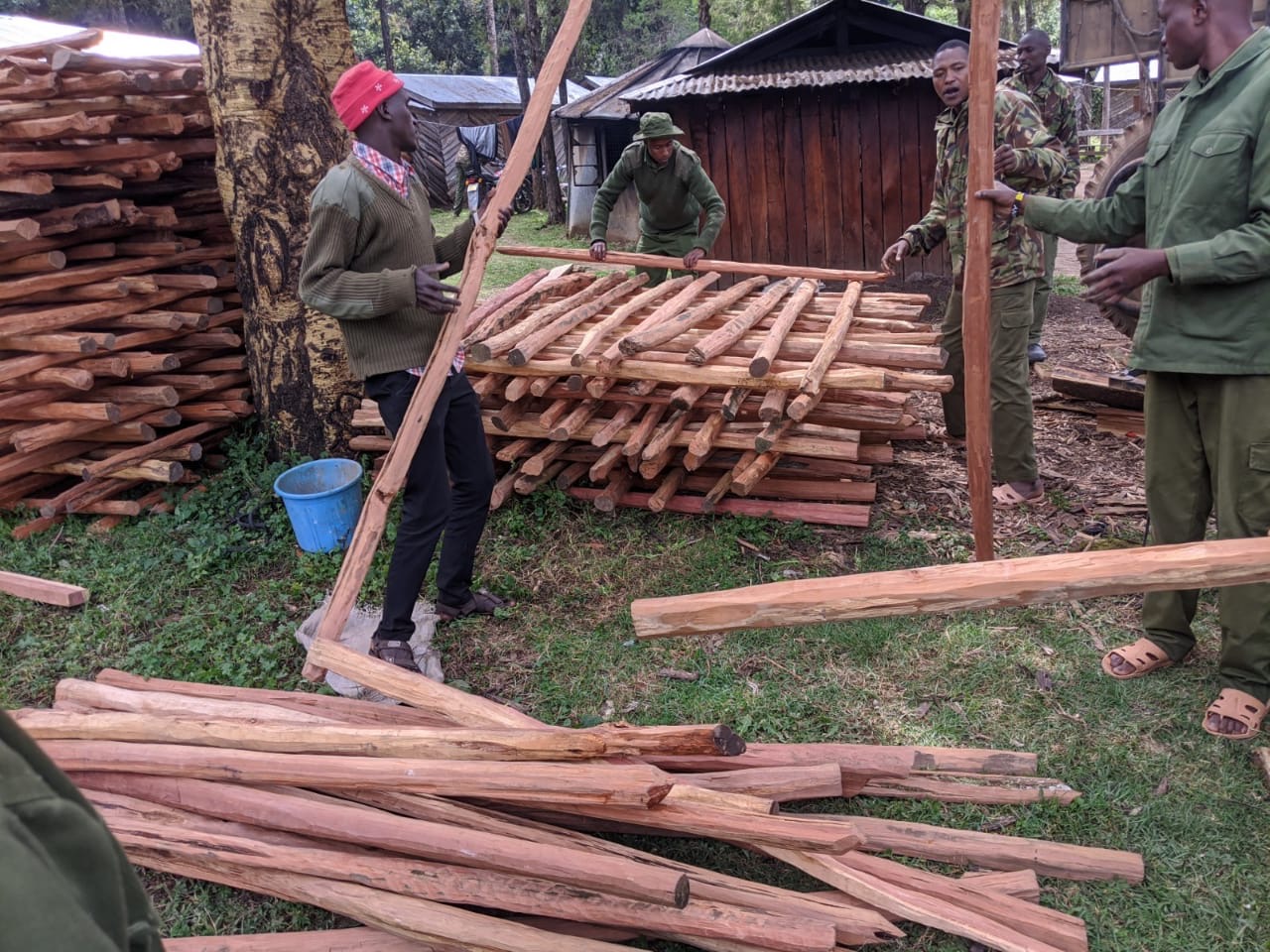
In August, rangers found four motorbikes transporting 152 red cedar post in the Nkareta area.
On September 26 alone, the MEP/SWT Echo ranger unit stationed in the Chepsir Forest in the Kericho area of the Mau destroyed a total of 56 bags of charcoal in two separate operations. The first operation, they discovered logs that had been illegally chopped down to make charcoal and arrested two suspects alongside our government partners. The second operation, they discovered 17 donkeys transporting 49 sacks of charcoal out of the forest. They were also able to arrest two suspects as a result of this bust. Then, on November 12, this team received intelligence about an illegal logging operation in the forest and when they arrived on site, they found evidence but no suspects. They were able to confiscate 26 logs and made a plan to ambush the site the next day. This proved successful when they arrested one suspect transporting timbers made from the illegally cutdown logs on a motorbike and discovered a larger tractor carting the timbers out of the forest, 21 in total. Later that week, in the Chepsir Forest, the ranger team arrested five suspects for charcoal production and destroyed four active kilns. Later that night, they set up ambush sites to catch people leaving the forest with timbers and arrested one additional suspect with timbers on a motorbike. Finally, their week ended with a big bust at night and the arrest of three suspects transporting logs out of the forest.
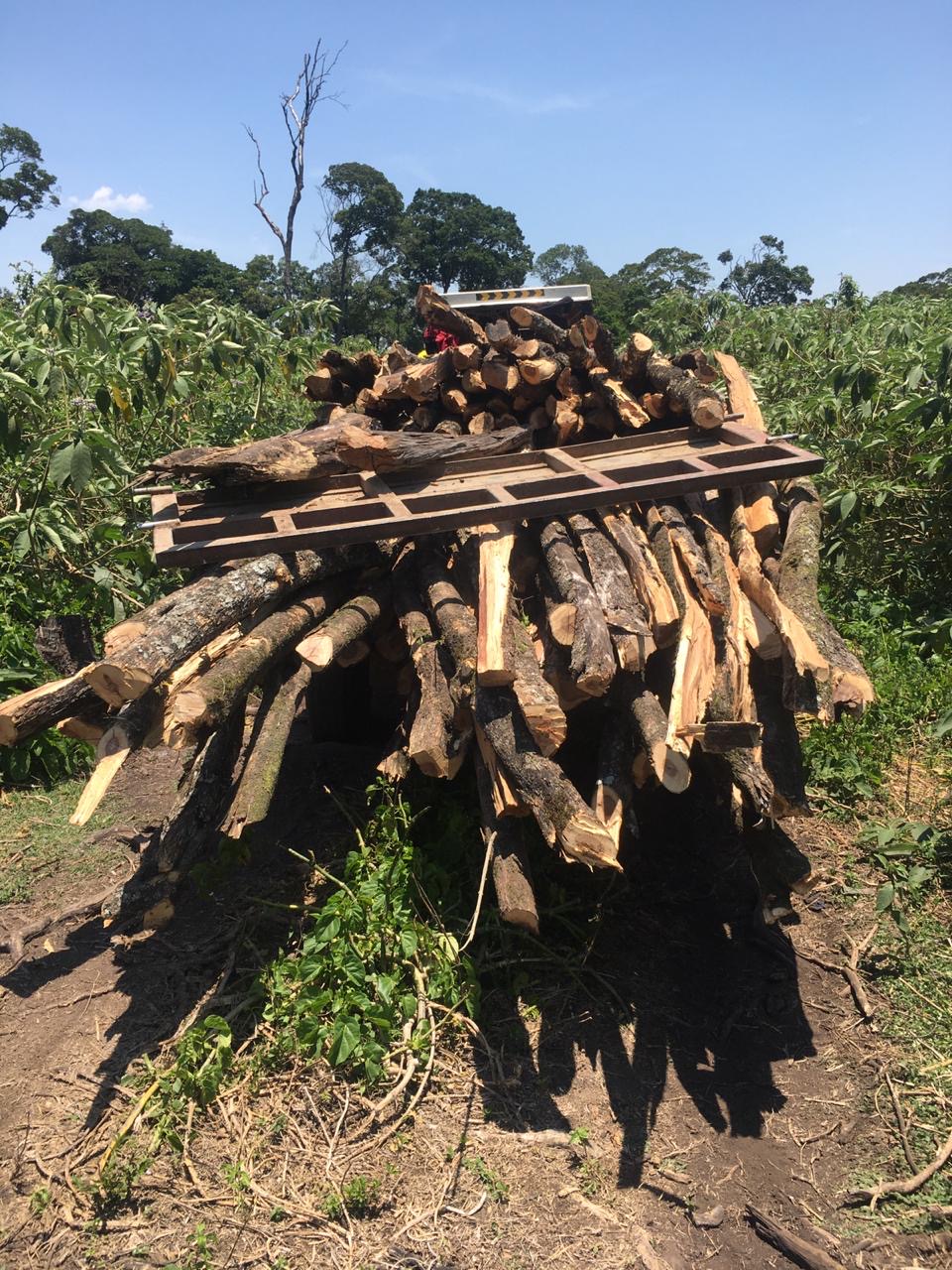 400 posts recovered on September 17 in the Transmara area.
400 posts recovered on September 17 in the Transmara area.
In total, in the second half of 2020, MEP rangers covered a distance of 6,203 kilometers (3,854 miles) on foot patrol, 56,340 kilometers (over 35,000 miles) by patrol vehicle and 10,437 kilometers (6,485 miles) by motorbike.
 MEP rangers participated in two interesting rescues during the second half of the year. In October, MEP received a call from a local community member that he had taken in a young giraffe calf for the night that was found roaming alone. He asked if MEP rangers could go out the next day to look for the mother of this calf in hopes of reuniting the two (pictured left). So, on October 21, MEP rangers went on patrol to look for the mother. They were very lucky and found her wandering around the same area the baby was found. They quickly took a MEP patrol vehicle over to gather the baby and safely transported him to be reunited with his mother. Then, in November, MEP got a call about an elephant that had gotten stuck in a sewage soak pit by Sidai Camp in the Oloolaimutia area of the Mara. MEP deployed rangers to help with the rescue efforts alongside partners. An excavator was provided by Olarro Conservancy in an attempt to dig out a path for the elephant and help the water surrounding him drain. Luckily, after several hours of work that went into the night, the pit was drained, and a path was cleared for the exhausted elephant to break free. Operations like this are only successful because of the partners that all come together to ensure a positive outcome.
MEP rangers participated in two interesting rescues during the second half of the year. In October, MEP received a call from a local community member that he had taken in a young giraffe calf for the night that was found roaming alone. He asked if MEP rangers could go out the next day to look for the mother of this calf in hopes of reuniting the two (pictured left). So, on October 21, MEP rangers went on patrol to look for the mother. They were very lucky and found her wandering around the same area the baby was found. They quickly took a MEP patrol vehicle over to gather the baby and safely transported him to be reunited with his mother. Then, in November, MEP got a call about an elephant that had gotten stuck in a sewage soak pit by Sidai Camp in the Oloolaimutia area of the Mara. MEP deployed rangers to help with the rescue efforts alongside partners. An excavator was provided by Olarro Conservancy in an attempt to dig out a path for the elephant and help the water surrounding him drain. Luckily, after several hours of work that went into the night, the pit was drained, and a path was cleared for the exhausted elephant to break free. Operations like this are only successful because of the partners that all come together to ensure a positive outcome.
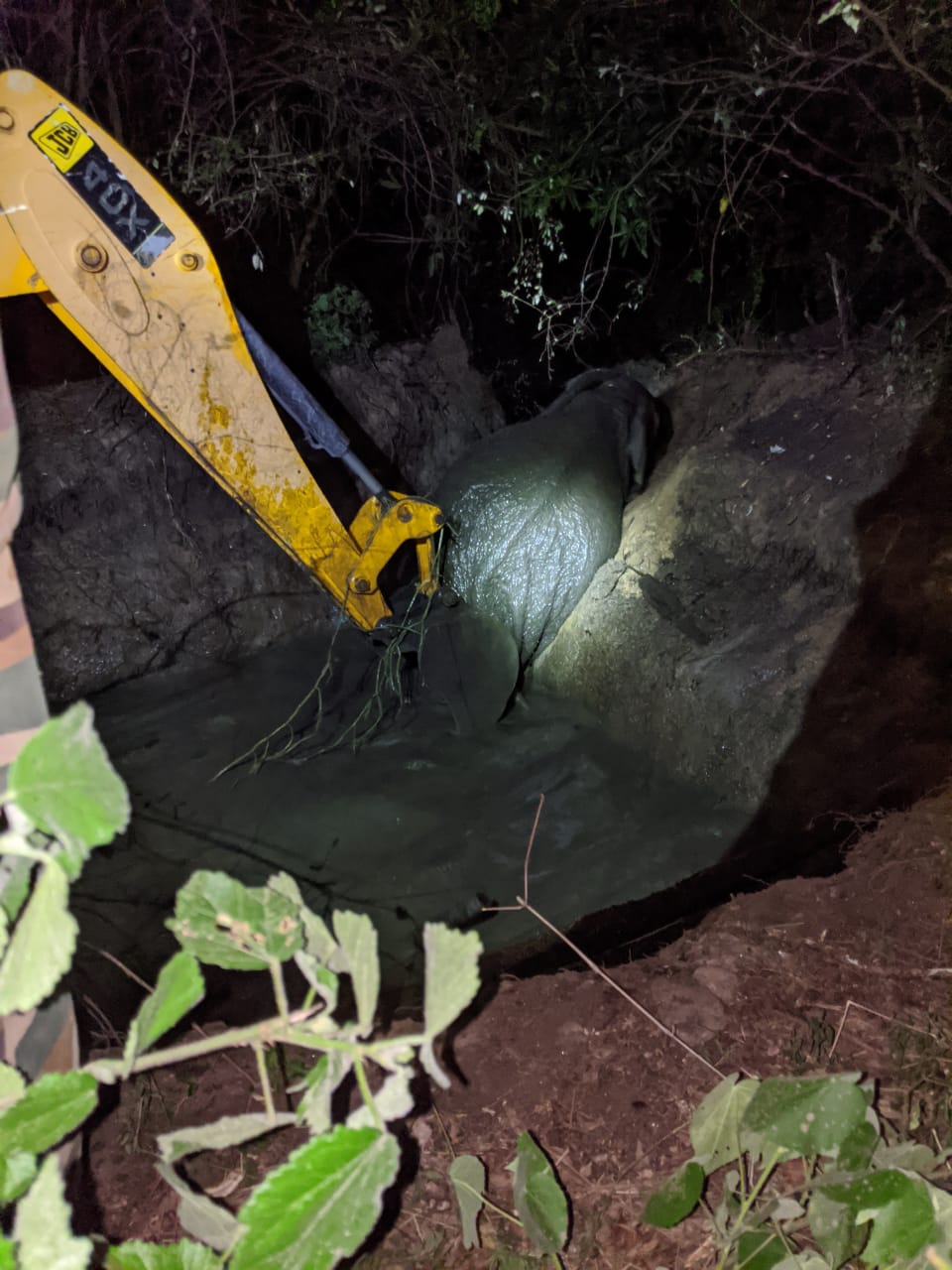
The trapped elephant being dug out.
Finally, on December 12, a MEP ranger team participated in the Ultra MARAthon, which was a 50 km relay race to raise funds for rangers in all of the Mara conservancies. This was a partnership between ForRangers, MMWCA, Salomon and MEP. The first prize for the fastest ranger team was a Boran bull and we are very proud to announce that the MEP ranger team took 1st prize. This makes the MEP rangers officially the fastest rangers in the Maasai Mara.
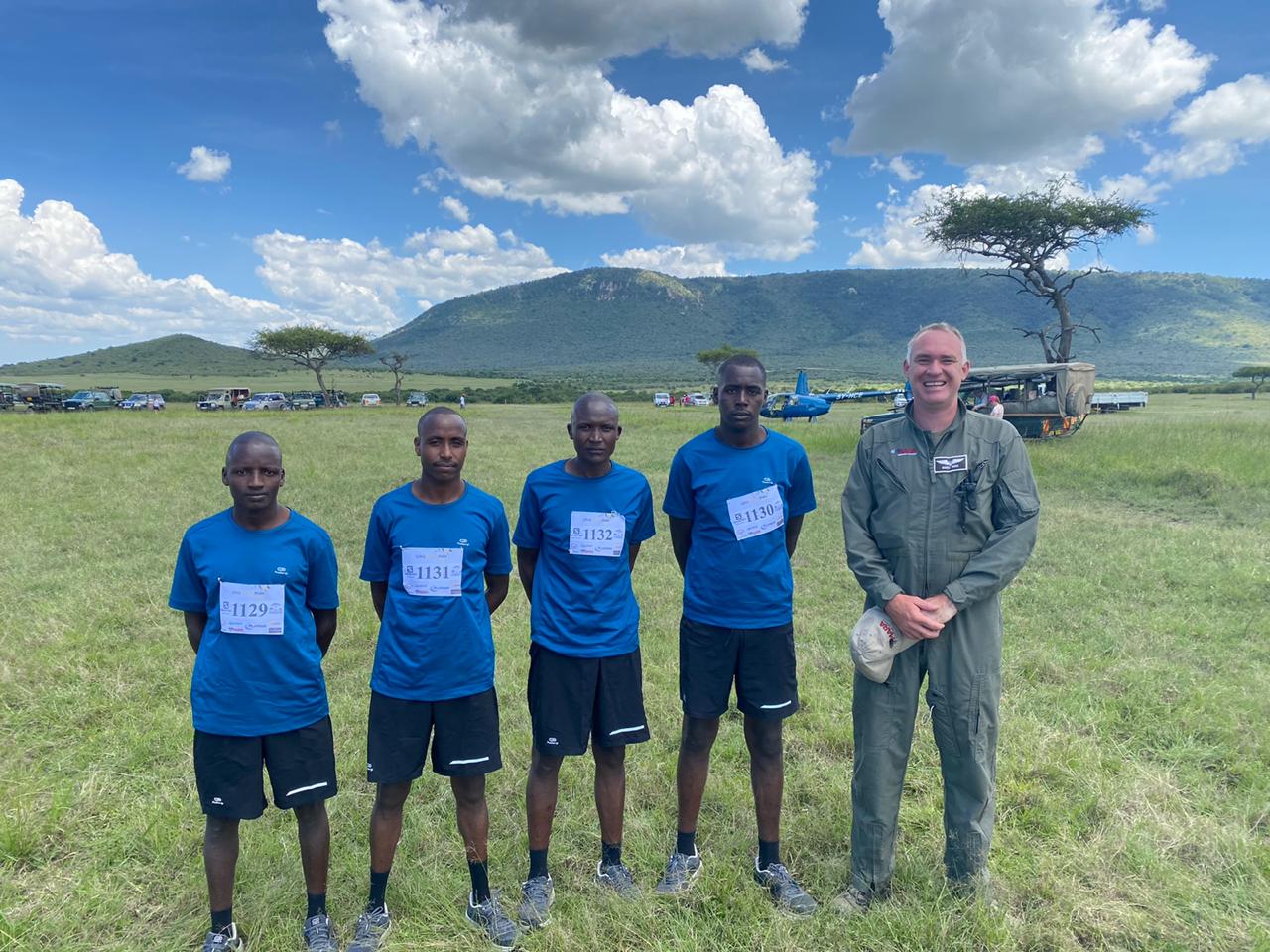
The MEP ranger marathon team with CEO Marc Goss.


